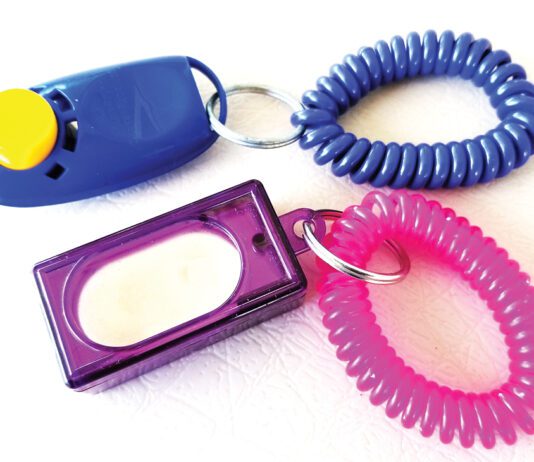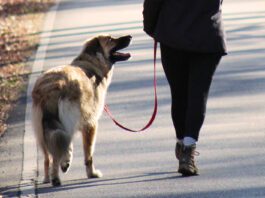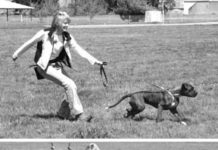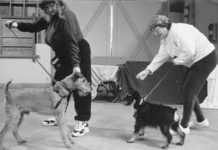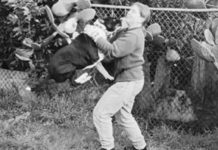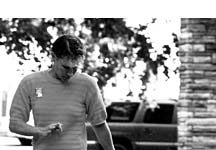Why Punishment-Based Dog Training Doesn’t Work
By definition, punishment is something that will decrease the probability of the occurrence of a certain behavior. Generally, this punishment involves something that is sufficiently startling or aversive so as to thwart the “problem” behavior. If the dog has benefitted from the behavior in the past, it will take even more startling or aversive punishment to override his expectation of getting that reward again. Frequently, a punished dog stops attending to you; you become something to be avoided.
Blind Dogs Can Have Normal Lives Too!
Chewbacca is, in most ways, a normal, happy, seven-year-old Golden Retriever. He loves to play with the other dogs. Like most Goldens, he enjoys a good game of fetch. He joyfully embarks on daily off leash romps with his guardian, Jenny Alt, and her three other dogs. Chewbacca has one trait that makes him just a little different, however. He cannot see. With a few accommodations in training and management, blind dogs can enjoy happy, normal lives.
Advanced Positive Dog Training Terms and Techniques
such as going through a series of "weave poles."üPremack exercise: To get the prize
Teach Your Dog to Focus On Cue!
Teaching your dog to focus on you (on cue!) is a vitally useful skill – and not that difficult if you follow our step-by-step directions. If you’ve ever watched an obedience competition and marveled at the dogs who gaze intently at their handlers’ faces throughout the entire test, never once breaking eye contact, you know exactly what we’re talking about.
Canine Athletic Competition and Sports Psychology
Whether you and your dog are road-seasoned competitors in canine sports, just playing around" in novice dog shows
Canine Class for Aggressive and Problematic Dogs
the focus is on gradually teaching dogs new and more appropriate responses to increasingly proximate contact with other dogs. Pupils begin learning new skills behind visual barriers
Reinforcing Our Beliefs of Positive Dog Training
Regular readers of WDJ are aware that we advocate a positive approach to dog training, that is, using only dog-friendly methods to teach our canine companions how we want them to behave in our homes, our cars, our arms – our world. We eschew methods that hurt or frighten dogs, even in the name of the supposed “greater good.” We think there are plenty of dog-related examples to justify this stance, but occasionally, we also find it useful to look beyond the dog-training profession for reinforcement for our beliefs.
Playing With Your Dog Increases Socialization and Relationships
Different dogs have different play styles. If I tried to play patty-paws with our Australian Kelpie, she would slink away in horror. Her idea of a rousing good time is to help me bring the horses in for their evening grain. Our Cattle Dog mix, Tucker, would rather fetch a stick or a tennis ball, or go jump in the neighbor's pond. Our Scottish Terrier's response to the paws activity would be a bored Whatever . . . " but he'd be delighted to engage in a game of "Let's roust critters out of the drainage pipe!" "
Causes of Reactive Dog Behavior and How to Train A Reactive Dog
“Reactive” is a term gaining popularity in dog training circles – but what is it, exactly? In her book Clinical Behavioral Medicine for Small Animals, Applied Animal Behaviorist Karen Overall, M.A., V.M.D., Ph.D., uses the term to describe animals who respond to normal stimuli with an abnormal (higher-than-normal) level of intensity. Take a deep breath and relax. We have positive training solutions for dogs who "go off" or "lose it" in certain circumstances.
Some Great Leash-Walking Products
The best leash-walking products are effective in helping the owner train the dog not to pull (that is, they provide a large enough window of opportunity for the owner to successfully train the desired walking behavior), minimally aversive to the dog, easy to use, well-made, and affordable. (We put price last, since most owners of leash-pulling dogs would pay almost anything for a product that really helps them!)
Holistic Dog Care and Holistic Checkups for Athletic Dogs
It goes without saying that every dog should undergo an annual health examination, complete with laboratory tests to evaluate blood chemistry and composition. Hard-working dogs – whether they are athletes or used for emotional therapy work – should be taken to the veterinarian for additional exams if their performance or attitude sours. In addition to conventional veterinary examination tehcniques, Dr. Bessent employs an age-old practice, taken from traditional Chinese medicine: tongue and pulse examination of the dog.
Training the Hearing Impaired Dog
hearing and deaf. Using a treat in your hand


